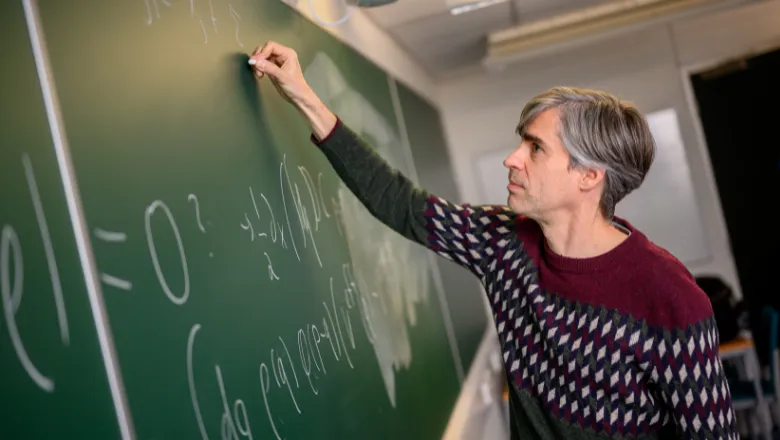Even if we know the fundamental laws of physics, we still know little about the relevant behaviours of physical systems."
Professor Benjamin Doyon
24 July 2024
Physicist awarded prestigious European Research grant to advance hydrodynamics as a unifying theory of physics
An expert in hydrodynamics – the theory of waves and quantum theory, Professor Benjamin Doyon has won an ERC Advanced Grant

Professor Benjamin Doyon aims to explore how hydrodynamics – the theory of waves – could have the potential to unify apparently disconnected concepts in physics, thanks to a UKRI funded European Research Council (ERC) Horizon Advanced Grant.
The five-year project will see Professor Doyon advance his research on how hydrodynamics can help explain the relationship between the small and the large. He hopes this could help shed light on the behaviours of large, complex systems, such as liquids, living matter, and even the universe, which can be surprising and difficult to understand, a phenomenon known as ‘emergence’.
Professor Doyon said, “Even if we know the fundamental laws of physics, we still know little about the relevant behaviours of physical systems, because they often contain billions or more of basic objects, such as particles or quantum spins, from which, when they interact at the microscopic scale, new behaviours emerge at the large scales.
“This occurs in a diversity of systems, from electrons in metal and spins in quantum magnets, to molecules in a gas and even flocks of birds.
Physicists have attempted to develop concepts and techniques to connect the laws of science that we observe at one scale of space and time to those that we observe at other scales. According to Professor Doyon, the principles underpinning hydrodynamics could provide an approach.
Professor Doyon said, “from the smallest quantum particles being emergent ripples of unobservable quantum fields, to the appearance of molecules, the swelling of waves in water, the formation of planets and galaxies and the genesis of life itself, the chain of emergence is infinite.”
“Hydrodynamics is a powerful framework for studying these emergent, large-scale behaviours in many-body interacting systems, and its general principles can be applied across many fields of study, creating bridges between areas of physics seemingly unconnected.”
ERC Advanced grants enable outstanding scientists to pursue innovative, high-risk projects aiming to advance major scientific breakthroughs. A theoretical physicist and leading expert on many-body quantum physics and hydrodynamics in the Department of Mathematics, Professor Doyon co-pioneered a highly successful theoretical framework referred to as Generalised Hydrodynamics (GHD). This theory has answered previously open questions about the large-scale laws of motion that arise when basic constituents – atoms or molecules, light fields, liquids - are constrained to move in one-dimensional settings, where a property called “integrability” often surfaces.
GHD has explained the special behaviours of waves found in anything from elongated tanks of water through to gases of cold Rubidium atoms constrained by magnetic fields. But the principles he has developed go further: they can help bridge the gap in understanding how what happens at the tiniest lengths, often quantum-dominated, informs the behaviours on vast distances - the problem of emergence.
Hydrodynamics is a powerful framework for studying these emergent, large-scale behaviours in many-body interacting systems.”
Professor Benjamin Doyon
Professor Doyon said, “Generalised Hydrodynamics is a highly successful theory which finds many applications, from soliton gas to models of statistical mechanics, quantum chains and cold atomic quantum gases, with stunning experimental verifications.
“The development of GHD required us to focus on the general structures of hydrodynamics, leading us to propose new general methods to understand physical quantities at the largest scales of space and time.
“Questions remain: Can the behaviours of large complex systems be derived from microscopic models? What is a good basis for the emergent laws of many-body physics, from small to large scales? Hydrodynamics gives up to now partial answers and a clear way forward, but much is still open.”
Professor Doyon’s project, which kicks off in January 2025, aims to answer these questions, using GHD and integrability as a powerful tool with which to develop mathematical models, which can be then tested and verified in the lab.

